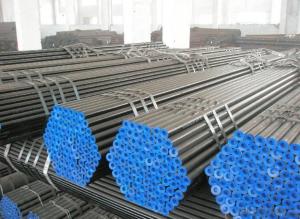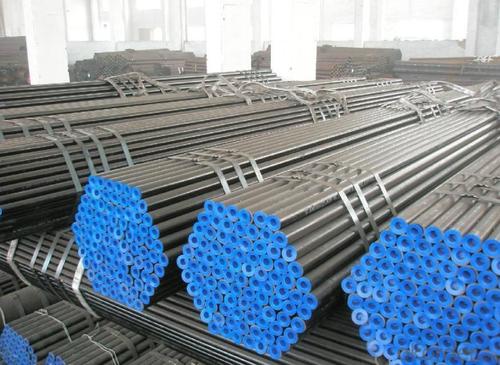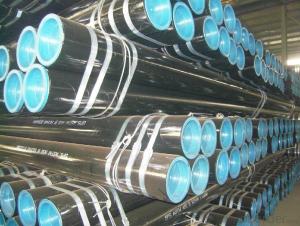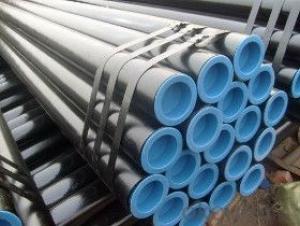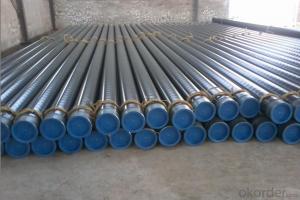Seamless steel pipe API,GB,ASTM,ASME,DIN high quality
- Loading Port:
- Tianjin
- Payment Terms:
- TT OR LC
- Min Order Qty:
- 10 m.t.
- Supply Capability:
- 5000 m.t./month
OKorder Service Pledge
OKorder Financial Service
You Might Also Like
1. Commodity Name: Seamless steel pipe
2. Standard: API,GB,ASTM,ASME,DIN
3. Quality grade: 10#, 20#, A106B, A53B, API 5L B, Q235, Q345, ST37-2, ST 45, ST52.etc.
4. Dimension:
OD: 1/2"-24"
WT: 2.5-80mm, SCH10~SCH40~XXL
length: 5.8m,6m,8m,9m,12m
5. Technique: Hot Rolled/Cold Rolled/ Cold Drawn
6. application
carbon seamless steel pipes are widely used in gas, water and oil, transpotation;constructions;Bridge,highway,windows of model steel door; building materials;fences;heating facilities Fluid Pipe;conduit pipe,scaffolding pipe.etc.
7. Payment Terms: L/C D/A D/P T/T
8.packing and shipment
Packaged in bundles,as per customers' requirements, it can also bepackagesd as beveled ends, typed marking, black painting, plastic caps protection,woven bags packing
For 20" container the max length is 5.8m; For 40" container the max length is 12m. other options are available based on customer requests. Please discuss when placing orders.
9. Surface: painted with varnish;
10. Plastic caps at ends.
11. Tolerance: OD +1%/-1%
WT +12.5%/-10%
12. Chemical composition:
Models of Steel Pipes | Chemical Component | |||||||
Steel 20 (ASTM A106B) | C | Si | Mn | P | S | Cu | Ni | Cr |
0.17~0.24 | 0.17~0.37 | 0.35~0.65 | 0.035max | 0.035max | 0.25max | 0.25max | 0.25max | |
Steel45 (ASTM 1045) | 0.42~0.50 | 0.17~0.37 | 0.50~0.80 | 0.035max | 0.035max | 0.25max | 0.25max | 0.25max |
16Mn(Q345B) | 0.12~0.20 | 0.20~0.55 | 1.20~1.60 | 0.035max | 0.035max | 0.25max | 0.25max | 0.25max |
45Mn2 ( ASTM1345) | 0.42~0.49 | 0.17~0.37 | 1.40~1.80 | 0.035max | 0.035max | 0.3max | 0.3max | 0.30max |
- Q: Can steel pipes be used for swimming pool installations?
- Yes, steel pipes can be used for swimming pool installations. Steel pipes are commonly used for plumbing systems and can be appropriate for swimming pool installations due to their durability and resistance to corrosion. However, it is important to ensure that the steel pipes are properly coated or treated to prevent rusting and deterioration in a pool environment. Additionally, other factors such as water pressure and compatibility with other pool equipment should also be considered.
- Q: How are steel pipes used in the manufacturing of conveyor systems?
- Steel pipes are commonly used in the manufacturing of conveyor systems as they provide a strong and durable structure for transporting materials. These pipes are used to create the framework and support structure of the conveyor system, allowing for the smooth movement of goods from one place to another. Additionally, steel pipes can be welded together to create longer sections, making them ideal for constructing lengthy conveyor systems.
- Q: How are steel pipes coated for protection?
- Steel pipes are commonly coated for protection through a process called galvanization. This involves immersing the pipes in a bath of molten zinc, creating a protective layer that prevents corrosion and extends their lifespan. Additionally, other methods such as epoxy coatings or polyethylene wrappings can be used to provide additional protection against external factors.
- Q: How do you solder purple copper plate and steel tube?
- The copper plate and the steel tube are brazed by brazing or argon arc welding.
- Q: How are steel pipes used in the construction of underground parking structures?
- Steel pipes are commonly used in the construction of underground parking structures for various purposes such as drainage systems, ventilation, plumbing, and structural support. The pipes are utilized to facilitate the efficient flow of water and sewage, provide ventilation to ensure air circulation and remove harmful gases, supply water to different areas of the structure, and offer stability and strength to the overall construction.
- Q: Can steel pipes be used for underground heat exchange systems?
- Yes, steel pipes can be used for underground heat exchange systems. Steel pipes are commonly used for this purpose due to their durability and resistance to corrosion. They can effectively transport and exchange heat in underground systems, making them a suitable choice for such applications.
- Q: What is the difference between steel pipes and cast iron pipes?
- The main difference between steel pipes and cast iron pipes lies in their composition and properties. Steel pipes are made from an alloy of iron and carbon, which gives them high strength and durability. They are also resistant to corrosion and can withstand high pressure and temperature conditions. On the other hand, cast iron pipes are made from molten iron, which provides them with excellent soundproofing capabilities and resistance to fire. However, cast iron pipes are more prone to corrosion and can be brittle, making them less suitable for high-pressure applications.
- Q: Are steel pipes suitable for underground installations?
- Indeed, steel pipes prove to be a fitting option for underground installations. Their durability, strength, and resistance to corrosion have made them a widely utilized choice for such applications. Able to endure high pressure and extreme temperature fluctuations, steel pipes are well-suited for transporting a variety of substances underground, including water, gas, and oil. Moreover, their exceptional resistance to environmental elements such as moisture and chemicals, commonly encountered in underground environments, further enhances their suitability. By implementing appropriate coatings and cathodic protection systems, steel pipes can enjoy an extended lifespan and retain their integrity even under harsh underground conditions. Consequently, steel pipes emerge as a dependable and fitting selection for underground installations.
- Q: What's the use of steel pipe?
- (processing workshop of Tianjin steel pipe company as a result of the steel pipe truss structure, the actual steel saving up to 42.9%), with a steel pipe manufacturing highway bridge can not only save steel, simplify the construction, but also can greatly reduce the coated area, saving investment and maintenance costs.
- Q: How are steel pipes used in structural applications?
- Steel pipes are commonly used in structural applications due to their strength, durability, and versatility. They are often used as columns, beams, and braces in buildings, bridges, and other structures. Steel pipes provide excellent load-bearing capacity and can withstand high levels of stress and pressure, making them ideal for supporting heavy loads. Additionally, their hollow cylindrical shape allows for easy installation and provides space for utilities such as electrical wiring or plumbing. Overall, steel pipes contribute to the stability and integrity of structures, ensuring their safety and longevity.
Send your message to us
Seamless steel pipe API,GB,ASTM,ASME,DIN high quality
- Loading Port:
- Tianjin
- Payment Terms:
- TT OR LC
- Min Order Qty:
- 10 m.t.
- Supply Capability:
- 5000 m.t./month
OKorder Service Pledge
OKorder Financial Service
Similar products
Hot products
Hot Searches
Related keywords
